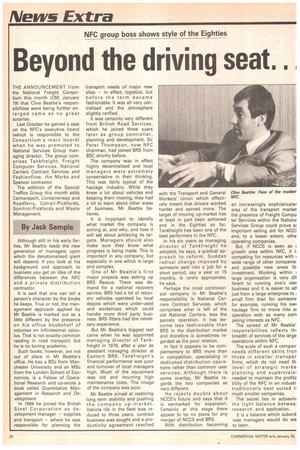eyond the driving seat..
Page 22

If you've noticed an error in this article please click here to report it so we can fix it.
By Jack Semple
THE ANNOUNCEMENT from the National Freight Consortium this month (CM, January 19) that Clive Beattie's responsibilities were being further enlarged came as no great surprise.
Last October he gained a seat on the NFC's executive board (which is responsible to the Consortium's main board) when he was promoted to National Services Group managing director. The group comprises Tankfreight, Freight Computer Services, National Carriers Contract Services and Fashionflow, the Marks and Spencer contractor.
The addition of the Special Traffics Group this month adds Cartransport, ContainenNay and Roadferry, Cotrali-Pickfords, Sonitrol-Pickfords and Waste Management.
Although still in his early forties, Mr Beattie leads the new generation of managers upon which the denationalised giant will depend. If you look at his background and approach to business you get an idea of the differences between the NFC and a private distribution contractor.
It is said that one can tell a person's character by the books he keeps. True or not, the management approach applied by Mr Beattie is marked out as a little different by the presence on his office bookshelf of volumes on infinitesimal calculus. That is not exactly common reading in road transport, but he is no boring academic.
Such books, however, are not out of place in Mr Beattie's office. He has a BSc from Manchester University and an MSc from the London School of Economics, is a Fellow of Operational Research and co-wrote a book called Quantitative Management in Research and Development.
In 1969 he joined the British Steel Corporation as development manager — supplies and transport — where he was responsible for planning the transport needs of major new sites — in effect, logistics, but before the term became fashionable. It was all very centralised and the atmosphere slightly rarified.
It was certainly very different from British Road Services, which he joined three years later as group controller, planning and development. Sir Peter Thompson, now NFC chairman, had joined BRS from BSC shortly before.
The company was in effect highly decentralised and local managers were extremely conservative in their thinking. This was fairly typical of the haulage industry. While they knew a lot about vehicles and keeping them moving, they had a lot to learn about other areas of business, Mr Beattie believes.
It is important to identify what market the company is aiming at, and why, and how it will set about achieving its targets. Managers should also make sure they know what progress is being made. This is important in any company, but especially in one which is large and complex.
One of Mr Beattie's first major projects was setting up BRS Rescue. There was demand for a national recovery service. BRS had a lot of recovery vehicles operated by local depots which were under-used and workshops which could handle more third party business. BRS fitters had the necessary experience.
But Mr Beattie's biggest test came when he was appointed managing director of Tankfreight in 1978, after a year as assistant managing director at Eastern BRS. Tankfreight's financial performance was poor and turnover of local managers high. Much of the equipment was old and incurring high maintenance costs. The image of the company was poor.
Mr Beattie aimed at restoring long term stability and pushing the company up-market. Vehicle life in the fleet was reduced to three years, contract business was sought and a productivity agreement reached with the Transport and General Workers' Union which effectively meant that drivers worked harder and earned more. The target of moving up-market has at least in part been achieved and in the Eighties so far, Tankfreight has been one of the best performers in the NFC.
In his six years as managing director of Tankfreight he adopted, he says, a gradual approach to reform. Sudden radical change imposed by someone sent into a job for a short period, say a year or 15 months, is rarely appropriate, he says.
Perhaps the most controversial company in Mr Beattie's responsibility is National Carriers Contract Services, which comprises what is left of the old National Carriers, less the parcels operation. It has become less fashionable than BRS in the distribution market and therefore is sometimes regarded as the poor relation.
In fact it appears to be complementary to BRS more than in competition, specialising in dedicated distribution operations rather than common user services. Although there is some overlap, Mr Beattie regards the two companies as very different.
He rejects doubts about NCCS's future and says that it is earmarked for expansion. Certainly at this stage there appear to be no plans for any merger of NCCS and BRS.
With distribution becoming an increasingly sophisticate( area of the transport marke1 the presence of Freight Compu ter Services within the Nationa Services Group could prove al important selling aid for NCC and, to a lesser extent, othe operating companies.
But, if NCCS is seen as growth area within NEC, it competing for resources with wide range of other companie: and possible new areas fo investment. Working within large organisation is very dif ferent to running one's owl business and it is easier to ad just from a large enterprise to small firm than for someon€ for example, running his owi haulage firm to move into ai operation with as many corn peting interests as NEC.
The spread of Mr Beattie' responsibilities reflects th. breadth of services of the large operations within NEC.
The scale of such a comparr needs different skills fron those in smaller transpor firms, which do not need tft level of strategic marke planning and supervisiol needed to maintain the profits bility of the NEC in an industr traditionally best suited to much smaller companies.
The secret lies in achievin. the right balance betweei research and application.
It is a balance which subord nate managers would do we to learn.








































































































